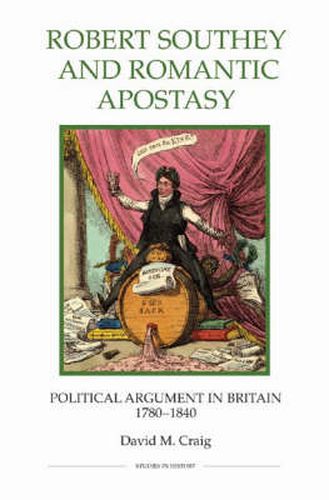Readings Newsletter
Become a Readings Member to make your shopping experience even easier.
Sign in or sign up for free!
You’re not far away from qualifying for FREE standard shipping within Australia
You’ve qualified for FREE standard shipping within Australia
The cart is loading…






Like William Wordsworth and Samuel Taylor Coleridge, Robert Southey has been remembered not just as a romantic poet but also as a political apostate. In the 1790s he was fired by enthusiasm for the French Revolution, and was knownas a radical and a republican. By the 1820s, however, he was not only the poet laureate, but a fierce conservative who opposed the reform of Church and State. Yet at the same time his reactionary politics were mixed with anxietyabout the effects of industrialisation and the growth of poverty, leading some commentators to view him as a precursor of socialism and collectivism.
This book charts the development of Southey’s social and political ideas inorder to throw light on the problems generated by the concept of ‘romantic apostasy’. It draws on his poetry, histories, journalism and letters to show that his intellectual evolution was more complex than has previously been thought. In so doing it touches on numerous themes: theological politics, national character, the ‘social question’, providence and history, questions of race, empire and civilisation as well as the nature of republicanism and the evolution of conservatism. As such it is an important contribution towards the wider understanding of the intellectual aftermath of the French Revolution in Britain.
DAVID M. CRAIG is a lecturer in History at the University ofDurham.
$9.00 standard shipping within Australia
FREE standard shipping within Australia for orders over $100.00
Express & International shipping calculated at checkout
Like William Wordsworth and Samuel Taylor Coleridge, Robert Southey has been remembered not just as a romantic poet but also as a political apostate. In the 1790s he was fired by enthusiasm for the French Revolution, and was knownas a radical and a republican. By the 1820s, however, he was not only the poet laureate, but a fierce conservative who opposed the reform of Church and State. Yet at the same time his reactionary politics were mixed with anxietyabout the effects of industrialisation and the growth of poverty, leading some commentators to view him as a precursor of socialism and collectivism.
This book charts the development of Southey’s social and political ideas inorder to throw light on the problems generated by the concept of ‘romantic apostasy’. It draws on his poetry, histories, journalism and letters to show that his intellectual evolution was more complex than has previously been thought. In so doing it touches on numerous themes: theological politics, national character, the ‘social question’, providence and history, questions of race, empire and civilisation as well as the nature of republicanism and the evolution of conservatism. As such it is an important contribution towards the wider understanding of the intellectual aftermath of the French Revolution in Britain.
DAVID M. CRAIG is a lecturer in History at the University ofDurham.